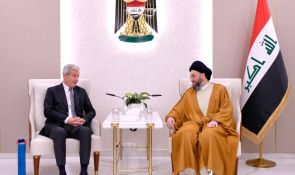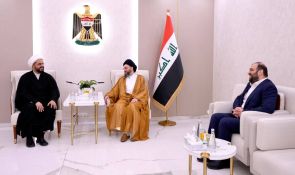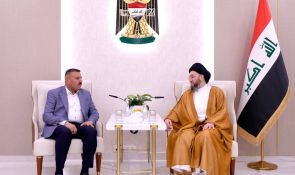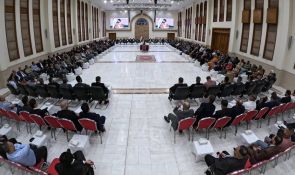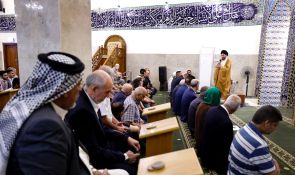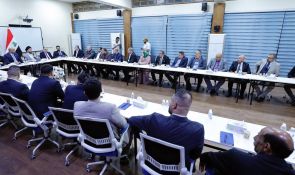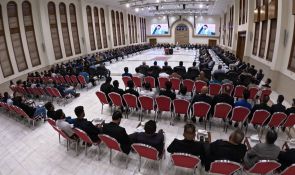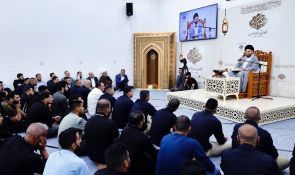Sayyid Ammar Al Hakim Assures That the Pure Blood Shed in Iraq Will Only Lead to More Persistence, Firmness and Determination
The Head of the Islamic Supreme Council, Sayyid Ammar Al Hakim, assured that the pure blood that is shed in Iraq will only lead to more persistence, firmness and determination of the Iraqi people and to more clarity in their vision of building this country. His Eminence explained that the unjust attacks targeting our people in general and the followers of Ahl Al Bayt (AS) in particular do not even respect this month of fasting, and added that the attacks are targeting innocent women, men, children and elderly whose only crime is asking to live in this honorable country.
This came during the second Ramadan evening gathering at his Eminence’s office in Baghdad on Friday, 12/7/2013.
Sayyid Ammar Al Hakim, while explaining the “Treatise on Rights” of Imam Sajjad (AS), stressed that the truth is a light and that a dark, rigid and veiled heart cannot see the light nor interact with the truth, and thus keeps going astray. His Eminence criticized the public fast breaking by some people in an Islamic country like Iraq, indicating that breaking the fast in public in front of all people and on the streets is an aggression against God and a violation of the sacredness of the holy month.
His Eminence explained that no matter how big a sin is, God’s Forgiveness is larger than all sins and misdeeds, stressing the need to be determined and to vow to return to God the Almighty no matter how many the sins.
In the Name of Allah, the Most Compassionate, the Most Merciful
The pure blood of our people will only lead to more persistence, firmness and determination
At first, I welcome you in this honorable gathering, the gathering of Ahl Al Bayt (AS). I wish you again a blessed Ramadan and hope that you spend it in obedience to God the Almighty. Please also accept my condolences that I extend to you, to all believers and to all our people for the series of bombings that are targeting Iraqis in general and the followers of Ahl Al Bayt in particular. We have seen what happened in the provinces of Diyala, Baghdad and Saladin and other areas. These unjust attacks do not even respect nor care about this month of fasting, and are targeting innocent women, men, children and elderly whose only crime is asking to live in this honorable country. This pure blood however will only lead to more persistence, firmness and determination of our people to more clarity in their vision of building this country.
Disobedience is a human’s injustice towards oneself when he commits a sin and turns away from the obedience of the Almighty.
We were talking about the “Treatise on Rights” of Imam Sajjad (AS) and we mentioned that this Treatise represents an important humanitarian document that regulates the human’s relationship with his God, with himself and with others. We were discussing the sixth right, which is (the right if your legs) and we reviewed some short but deep words said by Imam Sajjad (AS), then we moved to the first lesion learned from these words, which is when the Imam (AS) said “you don't walk towards anything unlawful”. We were explaining the meaning of these words, and also reviewing some applications of the Quranic verses and of texts attributed to the Prophet and His Household (AS), about how we should give this leg its right by not letting it walk towards anything unlawful, and we said that something “unlawful” is either when the legs take us to a place where others are aggressed or where others’ money is abused, either when they take us to a forbidden place where humans commit unlawful acts, and where there is aggression and injustice towards humans. Disobedience is a human’s injustice towards oneself when he commits a sin and turns away from the obeyance of the Almighty.
A dark and rigid heart cannot see the light nor interact with the truth, and thus keeps going astray
Also in the series of texts that support this idea of how the leg can take the human to disobedience and to unlawful acts, we can cite Bihar Al Anwar (Seas of Lights) Volume 45, p. 111, which mentions the sughra speech of Fatima (AS) after the Battle of Karbala when they took her to Kufa. She made a well-known speech where she said, addressing the army fighting Al Hussein (AS) “Woe unto you! Do you know which hand of you stabbed us, do you know what happened to the Household of the Prophet, do you know which soul tended to fight us, do you know the nature of the rigid and stony hearts and souls that rushed to fight Al Hussein (AS), his descendents and his companions. Do you know which with leg you walked towards us willing to fight us? If this leg took these soldiers to a war against Al Hussein (AS), to fight the master of martyrs, is it took us to something unlawful, then this is an unlawful battle. This is a misuse of the leg when it takes us to fight Al Hussein. What are the effects of this leg that takes us to something unlawful? Your hearts have gone stony, your souls have become veiled. Allah has set a seal upon your eyes and upon their hearing, Satan enticed them and prolonged hope for them and put a veil over your vision. You are not guided.”
When the heart becomes rigid, it becomes covered and prevents the human from seeing the truth. The truth is a light and a dark, rigid and veiled heart cannot see the light nor interact with the truth, and thus keeps going astray.
Some people are breaking the fast in public as if the country is not Islamic!
In Bihar Al Anwar, Volume 87, p. 332, the author quotes prayers by Amir Al Mu’minin (AS) such as “O Allah I beg You to forgive every sin that my foot stepped towards”, this means that this foot takes you to sins. “O Lord, I beg You to forgive every sin that my hand extended to, or my sight regarded”, if a sight is forbidden and you looked at it for too long while looking at it is forbidden, this leads the human to committing a sin, “or my ears listened to”, such as listening to a forbidden tune or forbidden lyrics, “or my tongue uttered”, like any kind of lying, slandering and defaming uttered by the tongue is forbidden. “O Allah I beg You to forgive all the sins caused by one of my organs, be it an eye, a tongue, a hand, a foot, or other or where I used what you bestowed upon me”, meaning that “O Allah you bestowed on me your kindness and care, but I used it in adversity towards You by committing disobedience”, then “I asked you to bestow on me your wealth to overcome my disobedience” , meaning that “I spent my money on forbidden things then I came to You my Lord asking for wealth while in disobedience and you gave it to me, then I used your wealth to overcome my disobedience”, I didn’t learn and I didn’t repent, and again you bestowed on me your wealth but I used it to keep away from You. “So You veiled me”, i.e. you didn’t reveal my secret, “then I asked you for more”, meaning but I am insolent and you gave me once, twice , three times and I used it in unlawful thins and I ask You to bestow more upon me again, “then I asked You for more but You did not deceive me”, O Allah how Generous are You. “You did not deceive me and I disobeyed You in public and You didn’t expose me”, this indicates the state of disloyalty and enmity to Allah to the point that you committed the sin in public. Sometimes, the human commits sins in public during Ramadan. Some people break the fast in public as if the country is not Islamic. Even if you’re excused or sick, why break the fast in public, on the streets, in front of people? Breaking the fast in public is an aggression against God. Where is the sacredness of this holy month in a country with a Muslim majority? This is divine legislation. “I still insist on disobeying You and You still bestow upon me Your clemency and forgiveness. Each time I insist on disobedience, You insist on forgiveness, generosity, giving and wealth, but I do not feel ashamed, I did not apologize, I did not benefit. Despite that, Your clemency and generosity upon me are great and unrestricted”.
In Bihar al-Anwar, V. 91, among the duas of Eid al-Fitr, "O Allah I am fasting, make it firm to you", "we are still in the beginning of the month, I want my fasting to be for You", "I endured hunger and thirst for You, Glorified be He, and devoted it sincerely to Your face", "whether by mistake or purportedly", "whether I was wrong or did it purportedly", "in the cases of omission and remembrance", and "memorization", "whether I conserved or lost my fasting, make me persist in Your obedience and help me serve You", "for things that I may have produced while fasting by mistake, omission or purportedly whatever the reason is", "for things that I have pronounced, seen or desired", "I am fasting during Ramadan but my self is longing for the sin", "my self liked it, my heart loved it, my sole desired or to which I extended my hand", "whether I have heard or seen something forbidden", "I have walked to it on my legs, I am fasting during Ramadan, on my legs I walked to the sin", "there are those who go to the mejlis of preaching, advice and satisfaction of Allah, Glorified be He, while there are others who walk to the sin in Ramadan", "from the halal You permitted by order from You to the haram you forbade by order from You", "he leaves the halal and heads towards the haram in the month of fasting", "O Allah make me firm in my fasting, and in the Eid, the reward day, we ask Allah, the One and Only, to forgive any behavior, saying, or move we may have undertaken towards a haram, whether by purportedly or by mistake."
Allah, Exalted be He, Established the Proof against His Servants
In Bihar al Anwar, V. 98, p. 222, in Arafah dua, "Praise be due to You Allah", "O Allah I thank You", "You ordered me, I disobeyed You, and all praise is due to Allah the Only Whom we thank for crisis", "praise be to Allah for what is right and what is wrong, for what is good or unjust", "all praise is due to You Allah, You ordered me, I disobeyed You, You forbade me, but I committed what you forbade me", "I disobey You in diverse ways", "I become so insolent that I do not apologize", "You established the proof against me. What can I say? I don't know!", "even according to the worldly rules, when one says, I don't know, it is said that the law does not protect the fools, but when it comes to the divine rules, I can't say I don't know, because Allah establishes the proof against His Servants", "I am powerless, I can't be victorious", "who am I compared to You my Lord, I have no power no might. No power or might of mine can match that of Allah, Exalted be He", "I am nothing, I draw my existence from You my Lord", "what is the best thing to receive You with my Lord", "You sent me prophets, divine books and scholars, it is no secret that Allah has the irrefutable proof, Allah established the proof against his Servants, and I don't have any proof or evidence that can overpower You my Lord", "with my hearing, my tongue or my leg", "this leg that walked to haram", "Aren't those the bounties You bestowed upon me", "I use those bounties against You", "with them all, I disobeyed You my Lord", "we lack the proof or the evidence when our leg drag us to the sin".
Forgiveness, To Put It Right: Repentance by the Servant, Forgiveness by Allah
In the Friday dua, "O Allah I shall not move from my place and my problem shall not vanish, unless you forgive me for every sin I have committed", that's what is called the insistence in request. You stand before Allah, Exalted be He, and say: I shall not move from my place until You forgive me my Lord. "Everything I left, while You ordered me with", "You forgive me for everything I abandoned while You ordered me with", "and everything I dared to do, while You forbade me to do", "forgive me every haram I made and then abandoned it". I committed a mistake, but today, I am repentant, this is called an irrevocable repentance. Because some repent, but recommit sins. There is irrevocable repentance. You forgive, and I shall become pure again and not recommit sins. "What have come to my eyes", any prohibited scene I looked at, a word to which I have listened or which I have pronounced", or anything that has entered into my stomach, "any prohibited food I have eaten", or "whispered into my heart", "each whisper that have run through my heart", "that I have enjoyed", "any prohibited thing I felt affinity to it", "extended my hand to it or walked to it on my legs", any prohibited thing I walked to it on my legs, O want You to forgive me for it my Lord, "or that has come into contact with my skin, I lost my modesty for it, or I leaned to it", any prohibited act, word or idea I have thought about, I want you to forgive me for them my Lord, "a determined and definite forgiveness", O Allah, I want today this forgiveness which I ask with irrevocable determination and decisiveness, I am on the path of obedience, today is Friday, and in the month of fasting and divine clemency, each of us is not moving from its place and is repeating the concepts we have learnt from Ahlul-Bayt. O Allah! We are all guilty and sinful, we looked and listed to what is prohibited, we walked to a haram, and touched a haram. O Allah we want You to forgive us for all these sins, we want to come out from this council pure, and we definitely guarantee and promise you that we will not recommit sins, "a determined and definite repentance after which there is no sin", You Lord wipe away all our sins, and we vow that we will not recommit sins. You have our promise that we will not commit sins, and You have to forgive us. When Allah accept such repentance and impart such forgiveness against determined will from the part of the servant, this would have great effects, "a forgiveness that purifies my heart and removes the burden from my back", the back becomes burdened with sins, "by which You pass my ill deeds, gall my back, sanctify my deed, and feed me my proof when I leave this world", and You establish the proof against me when I leave this worldly lie. So forgiveness, to put it right, is the repentance by the servant and the forgiveness by Allah, in its full meaning, it purifies the human being as if he were born anew as stated in some stories and texts. And what time is better than the month of purity? In the month of divine mercy and clemency, the most dangerous thing that can happen to the human being is to be depressed. He would lose everything. Imam Sajjad (AS) saw someone in Masjig al-Haram who failed to pray with the people. After the prayers, the Imam asked him why he did not perform his prayer. The latter said: I was one of those who killed Imam Hussein (AS) and my hands are stained with the blood of Hussein, how can the prayer be good for me. There is no prayer, fasting or good deed that can be useful to me. Imam Sajjad replied: being despaired of the mercy of Allah is more serious than what you have committed, even the murder of Hussein. One of such familiar stories is when a man came to the Prophet Muhammad (PBUH) and say: I live in remorse. The Prophet (PBUH): Why? What have you one? He said: I live from stealing the shrouds of the dead and one night, I took a body out in order to remove the shroud, it was a beautiful girl, the Satan whispered to me, when I approached her, she emitted a voice as if the Sky voiced such a crime and such a sin. Horrified, the Prophet (PBUH) dismissed him because he was a movable chastisement. He (PBUH) went to the mountains and withdrew from the people. He stayed there crying, whining and supplicating Allah, Exalted be He, to forgive him. Then was the proclamation where Allah ordered to find that man because He forgave him. However great the sin is, the divine forgiveness is even greater than our sins. We have be determined and promise Alla, Exalted be he, that that whatever we do, it is never late, and one can at anytime resume his obedience to Allah, Exalted be He, and praise be to Allah, the Lord of the worlds, and peace and benediction be upon you.


